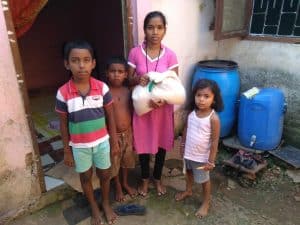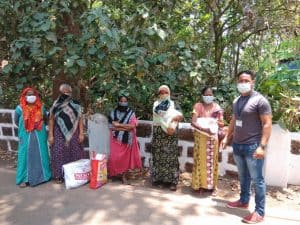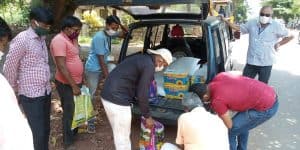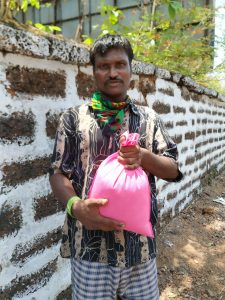Act for Goa gets Felicitated
Posted on 08/12/2022What is the mission of the Konkan Development Society? When were you first established as an organization? Who make up the members of the organization?
About Konkan Development Society:
The Development wing of the Konkan Province of Panjim (geographical demarcation of the Salesian order for administrative purposes) is registered as “Konkan Development Society” under the Societies Registration Act 1960. Its registration number is 207/Goa/2005 and address is Konkan Development Society, Don Bosco Provincial House, Odxel, Goa University P.O; Goa. The Province covers the State of Goa, four districts of Maharashtra and eight districts of Karnataka.
Organization’s Mission & Goals:
Konkan Development Society seeks to achieve integrated development of communities by building up capacities of NGOs, civil society organizations and community based organizations, enabling them to realize their hidden potentialities in social transformation through extension of support services like planning, networking, capacity building, research and documentation, development of program linkages, training, monitoring and evaluation.
The Organization has extended its Mission during this unprecedented world wide Covid 19 crisis, to include providing assistance to those who are badly affected by the lock down, which though necessary, has brought about immense misery and suffering.
Some of the goals are :
to establish, set up, conduct, provide, assist, promote and maintain educational institutions; to establish technical institutions and impart training; to promote adult education; to promote agriculture and allied rural activities; to launch self help programs for the poor; to work for development of women and children of underprivileged groups; to provide recreational facilities both in-door and outdoor; to contribute, subscribe, donate and collaborate with any organization which has similar objectives, in part or whole and to provide assistance to the needy in times of disaster and calamities.
Objectives:
To reach out to underprivileged urban and rural school children in villages, in slums and around construction sites, through Special Training Centres which provide services designed to meet their study and other allied needs. This would be required this year more than ever before, in the light of the situation of unemployment and deprivation created by the Covid 19 Pandemic.
To strive to protect young boys and girls from exploitation in society. To inculcate in them the principles of morality, democracy and secularism, irrespective of religion, caste or language
To make society aware about the social, psychological and economic situation of these children, their problems, the causes of these and their needs, through seminars, media and other social outreach programmes.
What type of projects was the Konkan Development Society working on prior to Covid19?
Various initiatives in the Province:
Education to out of school children:
It originally started off as the Mobile School Project, where children who weren’t attending school were collected by the Don Bosco Bus and taught on the bus itself. The next stage of this project was when students were collected and dropped off at various centers where they were taught the basics for a period of one year following which they were mainstreamed into formal schools. But with the Right to Education Act 2010 coming into force in April 2010, it made it compulsory for all children below the age of 14 years to be in school and that too, in age appropriate classes.
The child being illiterate or a drop out did not matter. Thus the focus of KDS shifted in 2011 to promoting retention by coaching these children who have not been in school or dropped out and bringing them on par to their age appropriate class syllabus. This Project was known as the Non Residential Special Training Centres (NRSTC).
The number of children reached out to and given basic literacy are as follows: In 2009-10, 110 enrolled and 59 mainstreamed; 2010-11, 257 enrolled and 167 mainstreamed; 2011-12, 318 enrolled and 200 mainstreamed; in 2012-13, 341 enrolled and 225 mainstreamed; in 2013 -14, 300 enrolled and 255 mainstreamed. In total 1326 children enrolled and 906 mainstreamed.
From April 2015 to March 2020, in collaboration with Colorcon Asia Pt. Ltd. a total of 501 mainstreamed students were assisted with dedicated teaching and remediation.
Don Bosco Tech:
Was born as the successful brainchild of a group of young Salesians of Don Bosco founded by the 19th century Italian priest, St. John Bosco. The Don Bosco Technical and Vocational training institutions throughout the country train and place poor youngsters in an attempt to build up a vibrant and tech oriented India. In the recent years of partnership with the Ministry of Rural Development in the skilling and placement of over 40,000 BPL youth has borne fruits of success. DBtech India has trained and placed more than 51,000 youth so far.
In the Konkan Province the institutions are in Loutolim and Quepem (Goa) offering hospitality and electrician, hospitality, ITES respectively; Kakati (Belgaum district Karnataka) offering automobile, electrician, welding, ITES, sales & marketing, Sutgatti (Dharwad district Karnataka) offering electrician, ISMO and ITES; Trasi (Udupi district Karnataka) offering automobile, electrician and hospitality and Pinguli ( Sindhudurg district Maharashtra) offering electrician and ITES.
Don Bosco Action India:
This project develops Self Help Groups, through training and capacity building programmes at the leadership level. It aims to eventually help the women become economically, socially and politically empowered through group initiated entrepreneurial activities.
The groups are spread over the state of Goa, Ratnagiri and Sindhudurg districts of Maharashtra and Gadag district in Karnataka. In the year 2010-11 there were 16 training programmes organized, 20 capacity building programmes and 3 exposure visits benefiting a total number of 975 individuals directly and 4689 indirectly; in 2012, there were 21 trainings organized, 35 capacity buildings and 5 exposure visits benefitting 2387 people directly; in 2013-14 there were 23 training programmes organized, 24 capacity building programmes and 3 exposure visits benefiting 2033 people directly. Since 2015-18 DBAI impact has grown to more than 200 Self Help groups across Goa Maharashtra and Karnataka benefiting more than 2500 direct beneficiaries. From 2018 to 2020, a total of 155 Women’s Groups contributed towards their household income. 1705 women have been trained under this Project and have established small scale entrepreneur units in their own villages.
Remedial School Project:
The Right to Education Act 2010 that came into force in April 2010 promotes a no failure policy till Std. VIII and this makes compulsory the promotion of students regardless of their results. Seeing this as a serious area of concern in the years to come KDS began its remedial teaching project. It aims to promote retention by assisting students in rural government schools who are weak in studies. In the year 2011-12 there were 24 centres spread across Maharashtra and Goa with approximately 576 students benefitting.
The Remedial School Project has benefited 24 school in Maharashtra and Goa targeting more than 1200 students across Goa And Maharashtra every year.
Since 2018 with the collaboration of Colorcon the project is benefitting 30 schools of Goa across North and South.
In 2019-20 579 benefitted from this outreach
Community Development at Shirahatti, Gadag District, Karnataka:
Intervention began in this area due to the problem of a high dropout rate. After conducting a feasibility study and presenting these findings to the Provincial and his council, the Development Office with their consent began with first remedial classes for the children with a total number of 50 in the month of April. The children were used as an entry point into the community and to gain the confidence of the people. To make a more detailed study; in the month of May 2012 the Province deputed Clerics Joel D’souza and Michael Dias under the guidance of the Konkan Development Society. At the same time the coordinator Mr. Rambabu K. appointed at the Centre in Shirahatti began exploring possible interventions with the women and the youth, 24 Panchayats were also contacted and K.D.S. was introduced to them with a request to work with them in the near future.
In the month of June, 5 women Self Help Groups and 2 youth groups were started. A programme was subsequently held for the youth on ‘Government Programmes for Dalit Empowerment- Role of Youth’ and through it the Development Office began its networking with the Municipality, the Taluka Panchayat, the Government Hospital as members from each participated as resource persons. The latter two interventions widened the working area of the Salesians from just Shirahatti town to 6 villages, namely Magadi, Yalavathi, Gojanur, Ranathur, Chabbi and Itagi.
The number of children presently availing of the Remedial Classes has increased to 210, with the financial support of Manos Unidas.
The programmes organized for the Self Help Groups have been on ‘Building Confidence in Self and Others’ and ‘Self Employment’, ‘SHG Management’ and ‘Money Management’. Tailoring classes and Computer awareness classes are also being held for the young women.
The Child Sponsorship Programme involves individual sponsors providing scholarships to Students belonging to the various educational initiatives within the Province (Non-Residential Special Training Centres, evening study classes, boarders in the Salesian institutions coming from poor families, students pursuing vocational training education outside the state, including youngsters interested in setting up own initiatives, etc). It covers the cost of education of that child for the period which the sponsor is willing to donate financially.
Colorcon – KDS Life Skills Programme: (2016 – 18) The main objective was to equip the participants with self confidence, decision making skills and leadership qualities, while bringing out their latent talents. The entire programme focused on topics related to daily life such as honesty, alcohol and drug abuse, time and money management; and also encouraged and trained the participants to deal with various real life issues like self-esteem, empowerment, critical thinking, civic responsibility, leadership, communication, team building and other such important matters.
Day Care Centre: Fostering a healthy mind in a healthy body at the right time is the best recipe for human development. KDS initiated the Day Care Centre which looks after tiny tots in the age group of 2 to 5 years. Nutritious meals are provided to the children while their parents are out earning a livelihood.
Don Bosco Pre-Primary and Primary School, Alto Dabolim and Odxel:
Don Bosco Pre-primary and Primary School, are instrumental in providing quality learning to children of the surrounding area with a special emphasis on the underprivileged and the marginalised.
St. Dominic Savio High School, Calangute :
In May2019 KDS extended its educational outreach to include a third School under its umbrella. The Calangute Peoples High School was handed over to us by the Trustees, who were keen to give the children the benefit of a Salesian education. There are 261 students and 15 Staff members, from Std. 1 to 10.
The Migrant Desk:
The Migrant Desk Project aims to motivate accompany and empower migrants to overcome the constraints and deprivation they face. Denial of rights and entitlements, lack of access to state provided services, exclusion from legal rights, banking protection and social security systems, vulnerability to ethnic religious caste, class and gender discrimination, abuse trafficking and exploitation at the work place and emotional and spiritual crises are among the concerns of the project.
Gender Equity and Equality:
Schools have the responsibility to create and nurture an environment that promotes Gender Equity and Equality. Don Bosco Action India, through the Province Development Office, Organized interactive sessions with Secondary and Higher Secondary students.
Adult Literacy Project:
The Adult Literacy Project, envisioned by TCS. As a computer based functional literacy programme, seek to enable basic literacy skills in non literate adults. This programme is being executed in various parts of Goa, Maharashtra and Karnataka in three different languages: Hindi Marathi and Kannada. 3889 beneficiaries have availed the benefits of this Project.
CHILDLINE 1098 :
The Don Bosco Konkan Development Society is the Collaborative partner for the implementation of the Childline 1098 project in South Goa, by the Ministry of Women and child development, govt. of India. Childline India Foundation is responsible for the running of Childline services across India. The Chilldine network currently spread over 462 locations across the country. KDS is working with CIF to implement the Childline project in South Goa.
We understand that the Konkan Development Society has stepped up to support vulnerable people throughout this quarantine period. Can you explain a bit more about how you guys mobilized to offer your support, and which communities you are currently working with?
When the lock down was mandated by the Govt., we realized that almost every section of society was affected adversely, particularly the daily wage labourers and those engaged in various kinds of manual labour. These people were left jobless and hungry and even homeless overnight, which was a crisis that needed urgent redress. So, under the initiative and guidance of our Executive Director, we got together as a Team and laid out our modus operandi for immediate action.
What have you been doing to support Goa during this lockdown period?
The Covid 19 Pandemic has brought with it fear, anxiety and deprivation. Thousands of people have been rendered homeless and hungry on account of the stringent measures put in place by the Government to contain the spread of the dreaded virus.
As part of the social outreach to the poor, the needy, the migrants and others on the margins of society, Don Bosco’s Konkan Development Society, through its Childline South Goa Collab. Office, has undertaken to provide these vulnerable members of society with food and other essentials like rice, wheat flour, cooking oil, lentils, sugar, soya chunks, soaps, onions and potatoes.
Till date 6050 needy families have benefited from this outreach.
Considering the unpredictable nature of the current situation, this is an ongoing initiative and through it we aim to reach out to as many people as possible.
What are some of the difficulties you have faced while trying to do this work?
Mobillizing funds for this good cause was, and is a big difficulty! So many concerned groups stepped forward to help those in need, so collecting funds was a big challenge! However, thanks to a number of generous and kind hearted people, money came in each day and we were able to keep buying the essentials that were required for distribution.
Another challenge was to reach the needy people, given the strict lock down rules. We managed to overcome this because of our CHILDLINE Project, which enabled us to get the necessary clearances to carry out our work. The sheer numbers of people who needed help was yet another challenge!
What has been the most rewarding part of this experience?
The tears of joy and the smiles of the people who felt touched with this assistance was a big reward! Knowing that we were contributing our little effort to assuage the hunger of our fellow human beings was reward enough for our efforts.
How many migrants/day laborers have you fed/supported thus far?
KDS has outreached to 5000 migrant/ day laborers, around 200 northeastern communities and 1000 needy families
What is your plan moving forward? Do you see the type of support needed changing?
We have almost come to the end of our feeding initiative and moving forward we are turning our attention to the job situation and educational initiatives for disadvantaged children who have suffered the most on account of the abrupt disruption of their studies!
What do hope will be the biggest lesson in all of this?
This Pandemic has many valuable lessons for all of us! The biggest of these is that as a country and a society, all our facilities need to be made more egalitarian, to encompass all our citizens, so that the kind of humanitarian crises that we are now seeing will be minimized in future. Be it health care, housing, food, wages, jobs, or the environment, the disparity between the availability of these facilities has to all tells a sorry tale about the collective conscience of our country!










